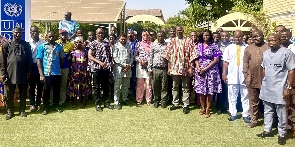“The lack of sustainable job opportunities in our community is deeply concerning. Often, our youth are left vulnerable, inclined to join sensitive groups, leading to potential chaos and danger,” said Abdul Mumin Senatu, Founder and producer of Shea cosmetics in Savelugu in the Northern Region of Ghana.
Senatu was one of the participants at a workshop to co-design sustainable livelihood value chains to inform interventions to support various communities to prevent violent extremism. The community engagement workshop, carried out by the United Nations Development Programme (UNDP) with funding from the Government of Denmark, aims to foster resilience by creating sustainable livelihood opportunities that prevent factors driving vulnerable individuals toward
radicalization.
This is seeking to address gaps, identified by UNDP in an assessment that
reveals that youth unemployment is the most common driver of vulnerability to violent extremism and radicalization in the Northern Regions of Ghana. In today's increasingly interconnected world, the quest for sustainable peace and stability has become more critical than ever.
Across the globe, communities grapple with the multifaceted challenges posed by violent extremism. Recognizing the urgency to address this pressing issue,
efforts are underway to empower communities through alternative livelihoods as a strategic tool in the fight against violent extremism.
Speaking at the workshop, Ms. Melody Azinim, Peace and Governance Analyst at UNDP Ghana noted that, “we cannot achieve peace without addressing the root causes of violent extremism. We must all support efforts to remove existing socioeconomic barriers that block progress for young people and women".
Highlighting the importance of providing alternative livelihood options to address the drivers of violent extremism and radicalization, Ms Azinim reiterated that “in our commitment to preventing violent extremism, we are keen on empowering communities through various strategies including supporting livelihood opportunities that will contribute to reducing vulnerabilities and
paving a transformative path to a future secured in lasting peace and stability”.
In a speech delivered on behalf of Alhaji Shani Alhassan Shiabu, the Northern Regional Minister, he noted that “the fight to eliminate radicalization calls for joint efforts. The Government of Ghana remains committed to rallying support aimed at strengthening socio-economic resilience across the country, especially by reinforcing community engagement to mitigate the factors contributing to vulnerability and then promote stability in Ghana”. During the workshop session, participants shared profound insights into the critical linkage between economic opportunities and the prevention of extremist activities.
“We’ve realized the importance of inclusivity and empowerment for every member of our society. It's not just about our individual growth but ensuring that our collective progress creates resilience against radicalization. Our pledges in this workshop reflect this combined front against violent extremism through sustainable livelihoods”, noted Mohammed Mujiyaba Dawuda, a participant from the Department of Horticulture, University for Development Studies.
In addition, Mavis Derigubah, another participant from the Department of Agriculture in Funsi eulogized the importance of co-creating sustainable livelihood solutions towards a resilient society.
“Our collective effort in this workshop signals a united stance against violent extremism. As we are prioritizing the co-creation of sustainable livelihoods and community engagement, we're creating a path toward a more resilient society, one that denies space for extremist ideologies to take root”.
Through strategic partnerships, UNDP is channeling resources and expertise to implement programs aimed at skill-building, economic empowerment, and supporting local value chains. These efforts are not only about offering economic alternatives but also about fostering community cohesion and strengthening social foundations to resist the divisive tactics employed by extremist groups.
Regional News of Saturday, 23 December 2023
Source: Praise Nutakor, Contributor

















